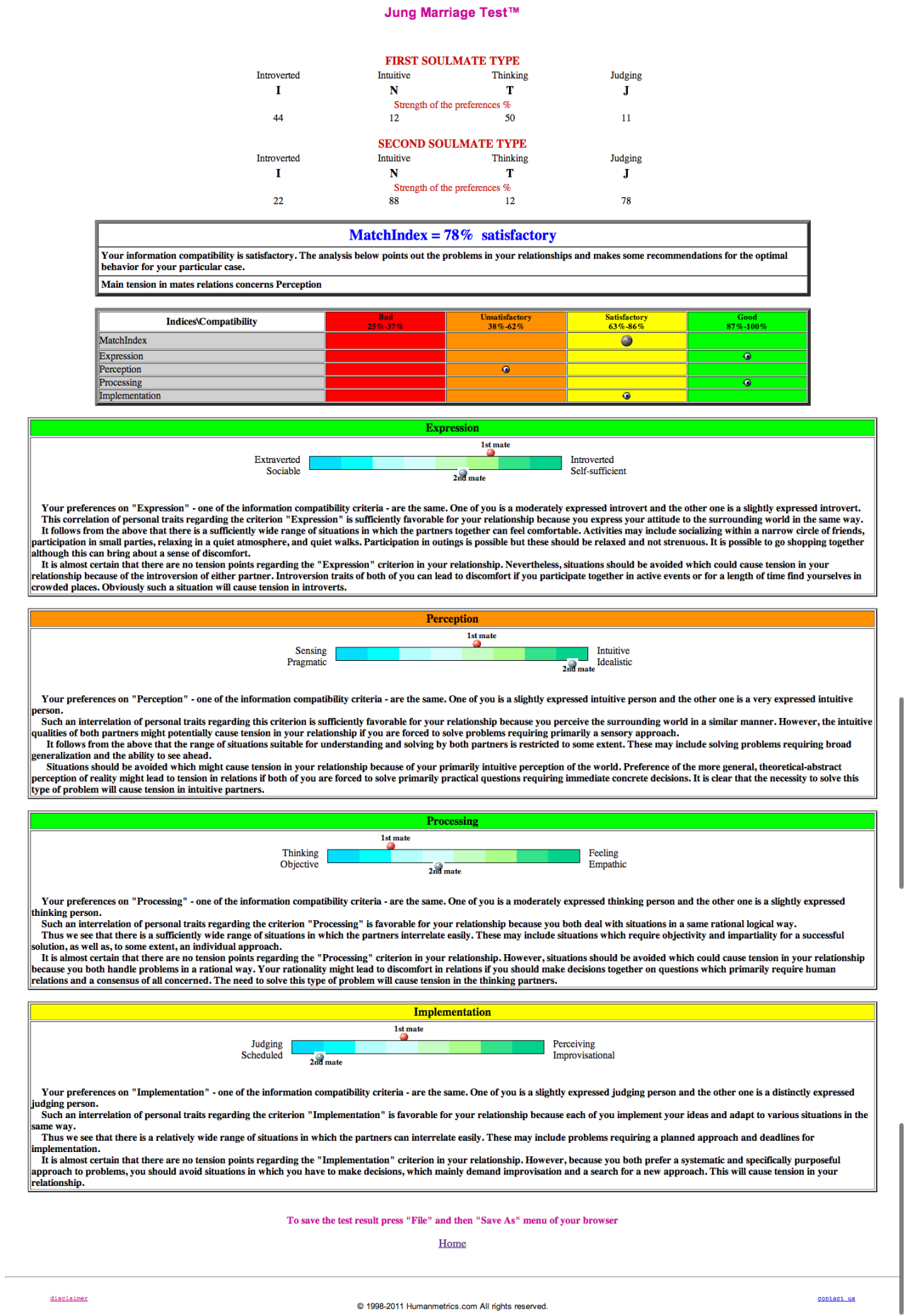
JEFF:
Introvert(44%)
iNtuitive(12%)
Thinking(50%)
Judging(11%)
MEL:
Introvert(22%)
iNtuitive(88%)
Thinking(12%)
Judging(78%)
Expression:
Your preferences on “Expression” – one of the information compatibility criteria – are the same. One of you is a moderately expressed introvert and the other one is a slightly expressed introvert. This correlation of personal traits regarding the criterion “Expression” is sufficiently favorable for your relationship because you express your attitude to the surrounding world in the same way. It follows from the above that there is a sufficiently wide range of situations in which the partners together can feel comfortable. Activities may include socializing within a narrow circle of friends, participation in small parties, relaxing in a quiet atmosphere, and quiet walks. Participation in outings is possible but these should be relaxed and not strenuous. It is possible to go shopping together although this can bring about a sense of discomfort. It is almost certain that there are no tension points regarding the “Expression” criterion in your relationship. Nevertheless, situations should be avoided which could cause tension in your relationship because of the introversion of either partner. Introversion traits of both of you can lead to discomfort if you participate together in active events or for a length of time find yourselves in crowded places. Obviously such a situation will cause tension in introverts.
Perception:
Your preferences on “Perception” – one of the information compatibility criteria – are the same. One of you is a slightly expressed intuitive person and the other one is a very expressed intuitive person. Such an interrelation of personal traits regarding this criterion is sufficiently favorable for your relationship because you perceive the surrounding world in a similar manner. However, the intuitive qualities of both partners might potentially cause tension in your relationship if you are forced to solve problems requiring primarily a sensory approach.
It follows from the above that the range of situations suitable for understanding and solving by both partners is restricted to some extent. These may include solving problems requiring broad generalization and the ability to see ahead. Situations should be avoided which might cause tension in your relationship because of your primarily intuitive perception of the world. Preference of the more general, theoretical-abstract perception of reality might lead to tension in relations if both of you are forced to solve primarily practical questions requiring immediate concrete decisions. It is clear that the necessity to solve this type of problem will cause tension in intuitive partners.
Processing:
Your preferences on “Processing” – one of the information compatibility criteria – are the same. One of you is a moderately expressed thinking person and the other one is a slightly expressed thinking person. Such an interrelation of personal traits regarding the criterion “Processing” is favorable for your relationship because you both deal with situations in a same rational logical way. Thus we see that there is a sufficiently wide range of situations in which the partners interrelate easily. These may include situations which require objectivity and impartiality for a successful solution, as well as, to some extent, an individual approach. It is almost certain that there are no tension points regarding the “Processing” criterion in your relationship. However, situations should be avoided which could cause tension in your relationship because you both handle problems in a rational way. Your rationality might lead to discomfort in relations if you should make decisions together on questions which primarily require human relations and a consensus of all concerned. The need to solve this type of problem will cause tension
in the thinking partners.
Implementation:
Your preferences on “Implementation” – one of the information compatibility criteria – are the same. One of you is a slightly expressed judging person and the other one is a distinctly expressed judging person. Such an interrelation of personal traits regarding the criterion “Implementation” is favorable for your relationship because each of you implement your ideas and adapt to various situations in the same way. Thus we see that there is a relatively wide range of situations in which the partners can interrelate easily. These may include problems requiring a planned approach and deadlines for implementation.
It is almost certain that there are no tension points regarding the Implementation” criterion in your relationship. However, because you both prefer a systematic and specifically purposeful approach to problems, you should avoid situations in which you have to make decisions, which mainly demand improvisation and a search for a new approach. This will cause tension in your relationship.